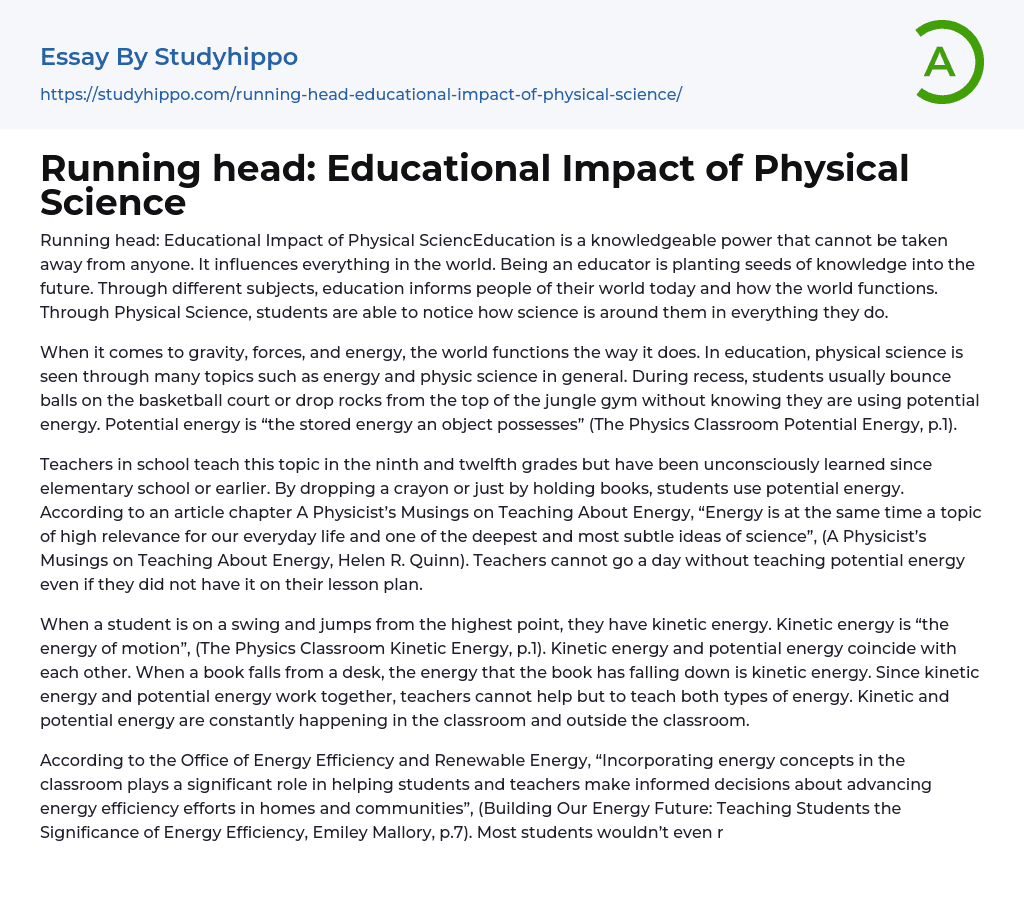

Running head: Educational Impact of Physical Science Essay Example
Running head: Educational Impact of Physical Science
The impact of education on individuals is significant as it influences all aspects of the world. As educators, our responsibility is to impart knowledge and foster a passion for learning in future generations. Education encompasses various subjects that enlighten individuals about the current world and its mechanisms. One such subject is Physical Science, which allows students to recognize the extensive presence of science in their everyday lives. Ideas like gravity, forces, and energy play a role in shaping how the world operates.
Physical science in education covers various topics, including energy and general physics. Students often participate in activities like bouncing basketballs or dropping rocks from jungle gyms during their free time. These activities involve the use of potential energy, which is defined as "the stored energy an
...object possesses" (The Physics Classroom Potential Energy, p.1). Even though formal instruction on this concept occurs in ninth and twelfth grades, students unintentionally learn about it as early as elementary school when they drop crayons or hold books.
According to the article "A Physicist's Musings on Teaching About Energy" by Helen R. Quinn, energy is both a highly relevant topic in our everyday lives and one of the most complex concepts in science. Teachers are constantly teaching potential energy, even if it is not explicitly included in their lesson plans. For example, when a student jumps from the highest point of a swing, they demonstrate kinetic energy.
According to The Physics Classroom Kinetic Energy (p.1), "The energy of motion" is the definition of kinetic energy. Kinetic energy and potential energy are interconnected, as demonstrated when an object like a book falls from a des
and its energy is in the form of kinetic energy. It is crucial for teachers to educate students on both types of energy since they work together. Both kinetic and potential energy are always present, whether inside or outside the classroom.
Incorporating energy concepts in the classroom helps students and teachers make informed decisions on advancing energy efficiency efforts in homes and communities (Mallory, p.7). In her article titled "Building Our Energy Future: Teaching Students the Significance of Energy Efficiency," Emiley Mallory highlights this importance.
Educators have a crucial role in teaching students about the energy present in their surroundings. Physical science, which focuses on studying the non-living components of our world (Encyclopedia Britannica, p.1), differs from biological science and encompasses all aspects of our environment. It is the duty of educators to enhance students' comprehension of the world through physical science subjects like chemistry and astronomy. Education and physical science are inseparable in daily life.
Education is crucial for the presence of physical scientists and the understanding of concepts that affect everyday life. Life would be significantly altered without education and physical science. Albert Einstein, a profoundly influential scientist, had to self-educate in order to develop enduring theories and conduct experiments. As stated by Oxford Dictionaries, education can be defined as "A body of knowledge acquired while being educated".
Education is vital for all disciplines and fields of knowledge. For those studying education, it is necessary to have a solid understanding of basic sciences and be enrolled in relevant courses. Physical science holds particular importance in the field of education, serving as a fundamental element. Therefore, students pursuing an education major cannot avoid the study of physical science,
as it forms an integral part of their curriculum.
The education system plays a vital role in teaching individuals about principles of physical science. A desire to acquire knowledge is essential within this system. Education majors are crucial as they pave the way for various professions, including scientists, doctors, lawyers, educators, and more. Education impacts all facets of life.
Therefore, it is crucial to educate oneself first in order to properly study physical science.
References
- “Education | Definition of Education in English by Oxford Dictionaries.” Oxford Dictionaries | English, Oxford Dictionaries, en.oxforddictionaries.com/definition/education.
- “Kinetic Energy.” The Physics Classroom, www.physicsclassroom.com/class/energy/Lesson-1/Kinetic-Energy.
- Mallory, Emiley. “Building Our Energy Future: Teaching Students the Significance of Energy Efficiency.” Department of Energy, www.energy.gov/eere/articles/building-our-energy-future-teaching-students-significance-energy-efficiency.
- “Potential Energy.” The Physics Classroom, www.physicsclassroom.com/class/energy/Lesson-1/Potential-Energy.
- Quinn, Helen R. “A Physicist's Musings on Teaching About Energy.” SpringerLink, Springer, 1 Jan. 1970, link.springer.com/chapter/10.1007/978-3-319-05017-1_2.
- Spencer, J. Brookes et al. “Physical Science.” Encyclop?dia Britannica, Encyclop?dia Britannica Inc.,13 Dec.2018,www.britannica.com/science/phsical-sciencei
+
- Coaching essays
- Critical Thinking essays
- homework essays
- Learning essays
- Library essays
- Listening essays
- Literacy essays
- Mentor essays
- Physical Education essays
- Project essays
- Reading essays
- Research essays
- Sex Education essays
- Social Studies essays
- Standardized Testing essays
- Study Plan essays
- Teaching essays



